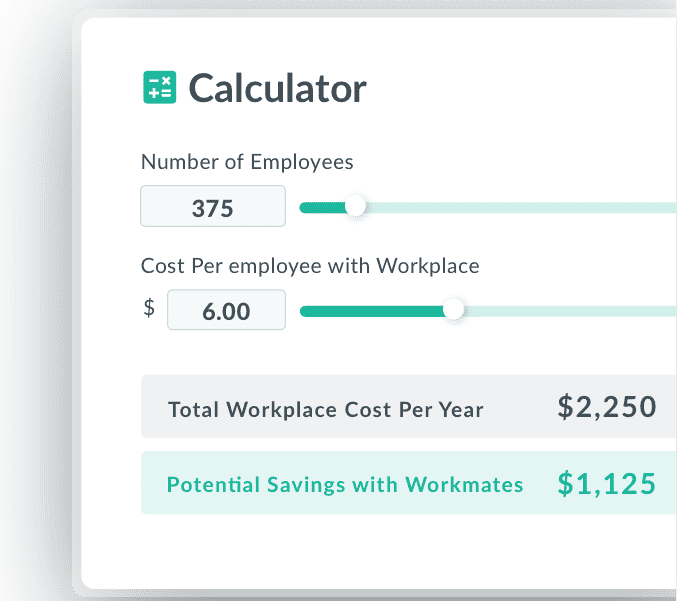- 5 Ways For HR Software to Improve Talent Retention
- #1. Performance tracking
- #2. Calculating bonuses and fair compensation
- #3. Improved onboarding efficiency
- #4. Fosters lifelong learning
- #5. Openness and transparency
- How to Choose the Right HR Management Tool?
- #1. Have a plan
- #2. Have a preliminary list of vendors
- #3. Set up demo calls with customer success representatives
- #4. Sign an agreement with a vendor
- Final thoughts


 Cut onboarding time
by 60%—here's the
Ultimate Checklist
that helped do it.
Cut onboarding time
by 60%—here's the
Ultimate Checklist
that helped do it.

It is frustrating when productive professionals leave your team. Sometimes, there’s no warning and it’s difficult to see an exit coming - but it happens nevertheless.
Replacing employees who have moved on is not only time-consuming, it’s also expensive. In fact, finding a suitable job candidate costs 2.5 times the salary for the opening.
To spend their time and money productively, business owners, team leaders, and talent managers should prioritize retention. In this post, you will find out how using HR software ( or figuring out how to develop a talent management platform on your own by learning Java on a platform like Codegym, as well as mastering other programming languages) helps keep teammates motivated and makes it easier to spot red flags.
The 40 Best Thank You
Messages for Colleagues
building a positive and engaged culture at your company.

5 Ways For HR Software to Improve Talent Retention
Automation and streamlining processes are the key benefits of HR software. Let’s take a look at how talent management tools assist team leaders in engaging and retaining professionals.
#1. Performance tracking
HR tools give talent managers a big-picture view of each teammate’s performance. There’s more to performance trackers than assessing productivity and spot when your peers are under-delivering.
You can use HR tools intelligently to determine which tasks teammates enjoy doing and which they tend to put off until the last possible moment. This way, team leaders can structure each professional’s workload to maximize productivity and satisfaction.
#2. Calculating bonuses and fair compensation
It’s common for employees to leave because they see no room for growth in the workplace. On the other hand, managers, caught up in daily to-dos, might forget about praising high-performing teammates.
To that end, compensation monitoring tools help talent managers, business owners, and team leaders incentivize growth-oriented peers. Also, HR software saves managers a lot of time by automating the compensation process.
#3. Improved onboarding efficiency
An employee’s loyalty to a company is decided early. If there’s no smooth onboarding and training, new hires can get discouraged, confused and start considering alternatives.
Since it’s challenging for team leaders to prepare all paperwork for onboarding, it’s helpful to automate key steps of the process. In fact, HR tools make onboarding smooth and efficient, by providing a single source of truth for all documentation, contact data, and helping employers track the progress of their training.
#4. Fosters lifelong learning
Employee education is crucial during onboarding but it doesn’t end there. To prevent teammates from burnout and encourage them to hone their skills, talent managers should invest in lifelong training.
HR software vendors often include features that help streamline learning, facilitate organizing workflows, remind teammates about relevant events in the area, and are integrated with learning management systems.
#5. Openness and transparency
Last but not least, some employees on your team could be prone to overthinking. Without feedback and the awareness of how their work improves the organization, they might consider themselves useless and leave the company out of the fear to be fired.
To make sure this doesn’t happen, talent managers need to focus on building transparent workplaces, namely:
-
Encourage employees to ask questions.
-
Promote peer-to-peer feedback sessions that improve workplace engagement.
-
Host regular review sessions that let people know how well they are doing.
HR management software is a powerful tool for improving transparency. For one, it facilitates internal communication and helps teammates stay in touch with each other. Also, talent management tools streamline scheduling, making it easy to turn regular review sessions into a long-lasting habit.
How to Choose the Right HR Management Tool?
Leveraging technology is a productive and effective way to improve employee retention. However, some products are more scalable and customizable than others - it’s important to do your own research and make the right choice.
While there are no precise selection criteria for finding the right HR tool, here are a few tips that’ll help avoid subpar solutions.
#1. Have a plan
Before you start vendor research, have a list of organizational needs (retention included) the tool is meant to address and features the team would benefit from. Such a plan will come in handy during preliminary vendor screening, helping you quickly shortlist efficient solutions.
#2. Have a preliminary list of vendors
When you understand which organizational needs the software should meet, it’s time to research available products. Here are a few tips for effective vendor research:
-
Prioritize customization and scalability: you will be using the platform you choose for years, so it’s better to choose a product that can accommodate growth.
-
Read online reviews on social media. Before adding a vendor to your list of alternatives, take a look at reviews on Facebook, Twitter, Reddit, and other platforms.
-
Ask your network for recommendations. Reaching out to fellow talent managers is helpful since they might suggest easy-to-use HR tools their teams rely on.
-
See how responsive vendors are. You definitely want to settle on a vendor who will be ready to assist the team and answer your questions - choose companies with reliable support.
#3. Set up demo calls with customer success representatives
Reach out to vendors you shortlisted and schedule demo calls. Prepare a list of questions to make sure the platform meets your team’s needs. It’s a good idea to record demo calls and send them to the rest of the team so that everyone gets a vote on the HR platform they will be using.
Also, don’t shy away from asking vendors for extra collateral - case studies, reviews, tutorials, and reports. These are helpful for comparing HR platforms feature-by-feature.
#4. Sign an agreement with a vendor
Once you decided which platform meets the team’s needs best, it’s a good idea to have one more talk with a vendor and discuss what’s included in the subscription or one-time fee. To avoid miscommunication down the road, make sure the company behind the platform answers the following questions clearly:
-
What are the payment terms?
-
Can prices change and under which circumstances does that happen?
-
What security and data protection practices does the vendor uses?
-
What extra services are included in the product package?
-
What are the ways for the team to participate in product development?
To make sure the development team doesn’t go back on their words, create a contractual agreement that outlines the terms of your agreement with the vendor.
Final thoughts
Employee retention is important for ensuring stability and productivity within the team. While the job market is generally volatile, using HR software helps quickly spot dissatisfaction and burnout red flags and mitigate challenges as soon as they arise.
To make the most out of HR tools, have a vendor selection plan. Be sure to approach negotiations thoroughly, asking vendors revealing questions and settling on terms that benefit your company.
About Author: This article is written by our marketing team at HR Cloud. HR Cloud is a leading provider of HR solutions, including recruiting, onboarding, employee engagement, and intranet software. Our aim is to help your company improve employee engagement, employee productivity, and to save you valuable time!
Find Out How Much You Can Save by Switching to Workmates.
and save upwards of 60%

Keep Reading
Why Healthcare Organizations Choose HR Cloud Over Alternatives
What is the Best Healthcare HR Software for Medical Organizations?
The Complete Guide to Remote Work Policy Compliance: Navigating Multi-State Tax, Legal, and Security Requirements in 2026
With 22.9% of US employees working remotely as of Q1 2024—up from 19.6% the previous year
Enterprise HRIS Implementation: Rippling vs HR Cloud Integration Capabilities and Deployment Success
Enterprise HR Software Implementation Comparison
Like What You Hear?
We'd love to chat with you more about how HR Cloud® can support your business's HR needs. Book Your Free Demo

Build a Culture of Recognition. Boost Engagement. Guaranteed.
Workmates empowers employees to stay informed, connected, and appreciated—whether they’re on the front line, in the office, or remote. Recognition drives 12x higher engagement.Trusted by industry leaders in every sector




Cut Onboarding Costs by 60%.
Take the confusion and follow-ups out of onboarding with automated workflows, digital forms, and structured portals—so new hires ramp faster 3X quicker.Trusted by industry leaders in every sector




.jpg)
